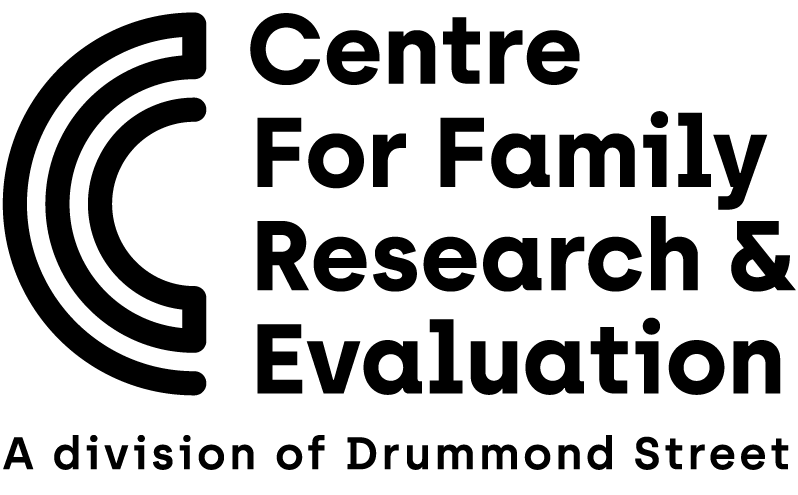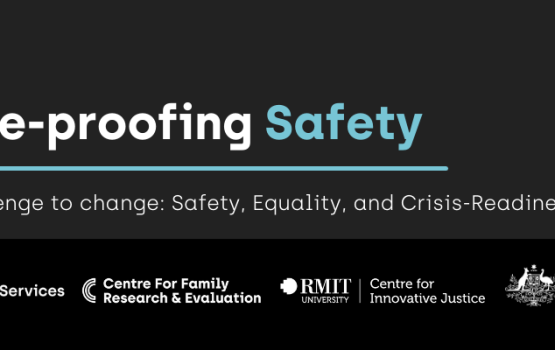Led by the Centre for Family Research and Evaluation (CFRE) at Drummond Street Services, in partnership with research partners the Centre for Innovative Justice (CIJ) at RMIT University and the Australian Institute of Family Studies (AIFS), and funded by Family Safety Victoria, Future-proofing Safety was a research project that sought to understand how services across Victoria responded to family violence during COVID-19.
Future-proofing Safety purposefully took a system-wide view of service interactions for people who experienced or used family violence during COVID-19. The multi-faceted project design recognised that many conventional entry points to support and approaches to service delivery fell away during the COVID-19 period. This occurred as practitioners contended with unprecedented challenges to support a population in crisis, while simultaneously adapting to the changes that the crisis brought about in their own lives.
The research highlighted a number of significant challenges and specific opportunities for services and clients that emerged over the course of the pandemic. These included elevated client risk and need, changed service responses, gaps and weaknesses within the family violence and sexual assault service system, and the complex impacts of COVID-19 on the workforce. In addition to highlighting key findings and recommendations, the final research report takes a future focus by offering a framework for crisis readiness responses that aims to future-proof how Victoria responds to family violence and disadvantage during future crises.
Working with the sector
Our innovative approach and partnership model prioritises sector input and leadership across the project. We worked collaboratively with partners across the community sector to shape the future of Victoria’s systemic responses to family violence.
Peaks, organisations and practitioners participated and provided valuable insights and feedback throughout the life of the project through focus groups, a practitioner survey and through a series of workshops.
Post-Launch Resources
The findings of this research project encompass service user experiences, including shifting experiences relating to risks, needs and types of violence during COVID-19. While acknowledging the immense contribution of the workforce in addressing elevated and complex risks during this period, this project also shows clear gaps and weaknesses that emerged in the service system and the impact of these gaps on service users.
These findings converge to highlight an indisputable need for crisis readiness responses that consider the impacts of large-scale disasters, as well as their associated policy responses, on those who use and experience family violence. This is particularly important for those who are already at the margins, as well as the service sector that support them.
The findings have produced the following resources announced at the launch on Friday 15th September 2023:
Future-proofing Safety Final Report
The Future-proofing Safety Final Report report highlights the significant challenges and specific opportunities for services and clients that emerged during COVID-19. These include elevated client risk and need, changed service responses, gaps and weaknesses within the family violence and sexual assault service system, and the impacts of COVID-19 on the workforce. The report finishes with a future focus by offering a framework for crisis readiness responses that aims to future-proof how Victoria responds to family violence during future crises.
Crisis Readiness Framework
The Future-proofing Safety Crisis Readiness Framework aims to support frontline staff, organisations, sector leaders and peak bodies from across family violence and sexual assault service system, and the Victorian Government to effectively prepare for and respond to future crises and shocks. Crisis readiness and response need to consider the overlapping cycle of preparation, response, aftermath and review. This framework is designed to help all levels of crisis-response through this cycle, with a particular focus on how crises can impact on family violence use and experiences. It sits alongside and is informed by Future-proofing Safety’s Final Report and Interactive Report.
Future-proofing Safety Interactive Report
The interactive report includes the findings and recommendations alongside the Crisis Readiness Framework. For further details please read the Final Report and the Framework linked above.
Project updates
The most recent updates from Future-proofing Safety.
Update from 2023: Please join us for the launch of Future-proofing Safety
This launch will highlight key findings and recommendations and showcase the project’s Crisis Readiness Framework, aimed at future-proofing Victoria’s family violence service system in preparation for future disasters or crises.
WHEN: Friday, 15 September 2023 at 11:00am – 12:00pm
[maxbutton id=”3″ url=”https://www.eventbrite.com/e/future-proofing-safety-surfacing-inequality-and-building-service-capacity-tickets-695122649557″ text=”Register now!” ]
Update from 2022: Interactive report – Organisational case studies
The first interactive report for Future-proofing Safety includes three organisational case studies, each exploring family violence service data before and during COVID-19.
These case studies aim to help us better understand how the presentation of family violence has changed in the context of the pandemic for clients accessing GenWest (formerly Women’s Health West), Drummond Street Services and Good Shepherd.
You can read more by visiting the interactive report (also viewable below) or accessing a downloadable version of the report:
- Future-proofing Safety – Organisational case studies – PDF
- Future-proofing Safety – Organisational case studies – DOCX (Screen reader accessible version)
Contact
For more information on the project or to be added to our mailing list, please email cfre@ds.org.au.

